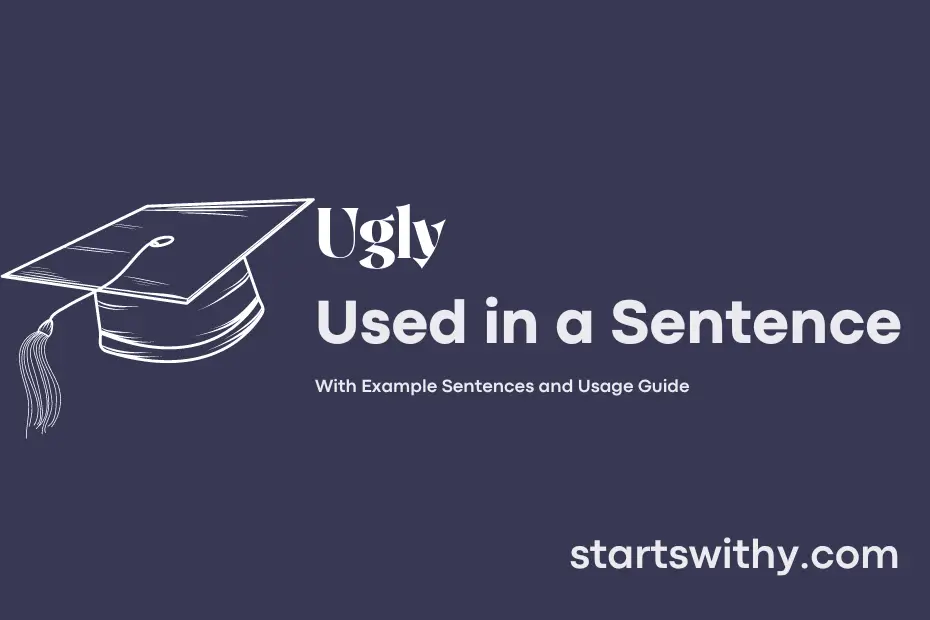Do you struggle to find the right words to describe something unpleasant or unattractive? The term “ugly” is an adjective commonly used to express displeasure, describing something that is visually unappealing, unpleasant, or displeasing to the eye.
In English, when we refer to something as “ugly,” we are indicating that it lacks beauty or aesthetic appeal. This versatile term can be used to describe anything from physical appearance to behavior or even inanimate objects that are not visually pleasing.
7 Examples Of Ugly Used In a Sentence For Kids
- The ugly monster scared the little children.
- I don’t like that ugly painting on the wall.
- The old witch had a very ugly face.
- The ugly frog hopped around the pond.
- My sister has an ugly sweater with bright colors.
- The ugly caterpillar turned into a beautiful butterfly.
- The ugly duckling grew up to be a graceful swan.

14 Sentences with Ugly Examples
- Ugly comments made by classmates can affect a student’s self-esteem.
- It’s important to speak out against ugly behavior in college to create a safer environment for everyone.
- Being judged based on appearance can lead to feelings of ugly comparison among students.
- Ugly rumors can spread quickly in college, causing unnecessary drama.
- Ignoring someone because of their background is just plain ugly.
- It’s crucial for college students to remember that true beauty comes from within and not from ugly societal standards.
- Ugly competition among peers can create a toxic atmosphere on campus.
- Criticizing someone’s choices without understanding their reasoning is simply ugly.
- Engaging in ugly gossip can tarnish someone’s reputation without valid reasons.
- Discrimination based on race, religion, or gender is not only ugly but also unacceptable in a diverse college setting.
- It’s important for students to challenge stereotypes and prejudices to prevent ugly discrimination.
- Taking part in ugly pranks or bullying can have lasting negative effects on a person’s mental health.
- Promoting unrealistic beauty standards can have ugly consequences on students’ body image and self-worth.
- Encouraging kindness and empathy over ugly judgment can help foster a more inclusive and supportive community on campus.

How To Use Ugly in Sentences?
To use “Ugly” correctly in a sentence, you can follow these simple steps:
- Understanding the Meaning: “Ugly” is an adjective that describes something unattractive, displeasing to look at, or visually offensive.
- Identifying the Context: Think about something or someone that lacks beauty or does not look appealing.
- Constructing the Sentence: Start by determining the subject of your sentence, which could be a noun (person, place, or thing) that you want to describe as ugly.
- Adding Description: Place the word “Ugly” before the noun to clarify that the subject is unattractive. For example, “The painting was ugly” or “She wore an ugly sweater.”
- Basic Structure: Subject + “ugly” + Object (optional)
- Practice: To get the hang of using “Ugly” correctly, practice by creating simple sentences. For example, “The weather was ugly today” or “That movie was ugly and boring.”
Remember, when using “Ugly,” consider the context and ensure that it is appropriate in the sentence. With practice, you will become more comfortable incorporating this adjective into your vocabulary.

Conclusion
In summary, the word “ugly” serves to describe something unattractive or displeasing. This term is commonly used to express the lack of beauty or aesthetic appeal in various contexts. For example, sentences with “ugly” could include remarks about an unattractive piece of clothing, a distasteful behavior, or even an unsightly building.
By using the word “ugly” in sentences, individuals can communicate their opinions or perceptions clearly and concisely. Whether discussing physical appearances, actions, or objects, this term helps convey negative judgments or critiques in a straightforward manner. Ultimately, the word “ugly” serves as a descriptive tool that allows for the straightforward expression of unattractiveness or lack of appeal in a wide range of subjects.



